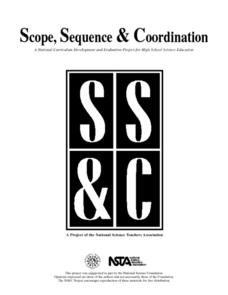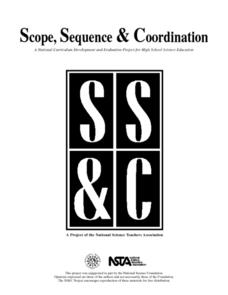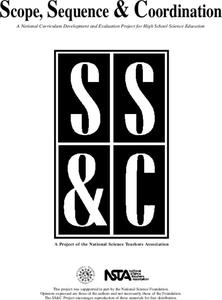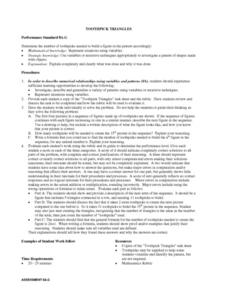Curated OER
Limiting Factors for Populations
The "Bottled Bacteria" activity instructions are a bit unclear, but the remaining activities investigating limiting factors in ecosystems are well-written. Learners model the exosystem of a bear and a herd of deer. They set up a...
Curated OER
Oils and Plastic
Peruse the properties of polymers with your materials engineers, chemistry aces, or emerging ecologists. The inquiries in this resource include puncturing polyethylene plastic bags, dissolving polystyrene cups, creating a polymer ball...
Curated OER
Oxidation
For an introductory physical class, you can use these vivid activities to introduce learners to chemical reactions. Spontaneous combustion, melting and burning, tarnishing and rusting all are evidence that a chemical reaction has...
Curated OER
An Introduction to Acids and Bases
Investigating pH is intriguing, especially with these activities designed for an introductory chemistry or physical science class. Pupils use litmus paper to distinguish acids and bases and then make indicators from food products. They...
Curated OER
Factors that Affect Reaction Rates
Collaborating chemistry pupils observe that temperatrue increases the movement of dye throughout water, stirring increases the dissolving rate of sugar cubes, and concentration of solutions increases the chemical reaction rates. These...
Curated OER
Catalysts and Enzymes
Biochemists experiment with the oxothermic decomposition of hydrogen dioxide by adding manganese dioxide. They observe how pepsin enhances the action of acid on the digestion of egg white proteins. They use yeast to make bread rise. All...
Curated OER
What's for Dinner?
View a video presentation comparing chemosynthesis to photosynthesis. Review the findings of the 2004 Ring of Fire Expedition that studied biological communities around the hydrothermal vents of the Mariana Arc. In collaborative groups,...
Curated OER
The Impact of Cultural Values in EArly Industrial England
Tenth graders analyze works from the period of the Industrial Revolution in England and identify the cultural values depicted and inferred that paved the way for the Industrial Revolution to occur at this time. They create captions that...
Curated OER
Wynton's Tune
Students examine the serigraph, "Wynton's Tune," by artist Faith Ringgold. They discuss the painting, listen to jazz music, create a drawing that tells a story inspired by their favorite music, and write sentences describing their artwork.
Desert Discoveries
Sonoran Desert ABC's
Third graders make alphabet cards that depict the wide variety of life forms found in the Sonoran Desert. A terrific lesson that combines language arts, visual arts, and life science all into one wonderful package. Each of the cards has...
Desert Discoveries
Who Depends on the Saguaro?
Young scientists design a picture of a saguaro cactus that shows the cactus and some of the animals and plants that interact with it. There are many of these special relationships between plants and animals of the Sonoran Desert. Your...
Arizona-Sonora Desert Museum
Desert People and the Saguaro
The saguaro is the focus of an examination of the importance of this stately cactus to the indigenous people in the Sonoran Desert.
Desert Discoveries
What's the Buzz on Native Bees?
Young biologists describe the different types of bees that are native to the Sonoran Desert. They look at the nesting and feeding requirements of the insects, and study how they are able to pollinate many plants found in the environment....
Curated OER
Skulls Tell It All
Skulls tell it all, and with this lesson plan, you will tell it all to your class! Youngsters view animal skulls, analyzing the shape of teeth and the placement of the eye sockets. They associate these adaptations with the types of food...
Desert Museum
Daisy Ecology
Here's a fine lesson that combines poetry with life sciences. Learners carefully listen to a poem that's all about a food chain. As the poem is read, learners name the producer, the herbivore, the carnivore, and the omnivore. Lots of...
Desert Discoveries
Desert Tortoise: Fact or Fiction?
Here is a good game that will determine which team knows the most about the Sonoran Desert tortoise. There are 16 questions posed, and the answers are printed in bold for the benefit of the teacher. Question # 16 reads, "Desert tortoise...
Curated OER
Hear Ye, Hear Ye: Read All About It!
Develop an online newspaper covering the Lewis and Clark Expedition. The class publishes their newspaper on the school's Web site and analyze both primary and secondary sources.
Curated OER
Inventions Over Time
Explore the inventions of the past with a project on ancient tools. After reading an article about hunting during the Archaic period, the Late Prehistoric period, and the Historic period, kids fill in a cause-and-effect chart about the...
Curated OER
Digging Up Dinosaurs
Young scholars research dinosaurs using text, software, and Internet resources while role playing as paleontologists. They place the information from their research in databases and publish an illustrated page about their findings.
Curated OER
A Study of Twentieth Century British Culture through Art and Literature
Here’s an interesting approach to the analysis of similar subjects in different mediums. Based on the methodology of Professor Jules Prown, learners apply his three stages (description, deduction, and speculation) to a painting and a...
Curated OER
Investigating Plant Pigments: A Guided Inquiry Laboratory Experiment
Students participate in a three-part lab in which they investigate plant pigments. Part I is designed to teach basic laboratory techniques of column chromatography, in Part II students design an experiment to separate the components of a...
Curated OER
Bloodstain Pattern Simulations: A Physical Analysis
Students receive bloodstain pattern evidence from a crime scene. They answer a series of questions through inquiry, observation, measurement, and analysis. Pupils complete this challenge, by reconstructing the evidence through four...
Curated OER
Compare and Contrast Cultures
Using informational text to make cross cultural comparisons is a great way to build a global understanding and comparative analysis skills. With several handy worksheets and a Venn diagram the class will read to make cross textual...
Curated OER
Toothpick Triangles
Students draw a chart (included in the lesson) to use with their investigation. They review terminology of triangles and receive toothpicks to use in the lesson. Beginning with three toothpicks, students form a triangle. They complete...
Other popular searches
- Geographical Discoveries
- Scientific Discoveries
- Discoveries and Inventions
- Medical Discoveries
- Biological Discoveries
- Telescope Discoveries
- Greatest Discoveries
- Discoveries Sciences
- Internet Discoveries
- Important Discoveries
- Density Discoveries
- Captain Cook Discoveries

























